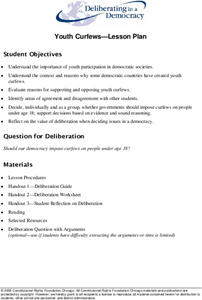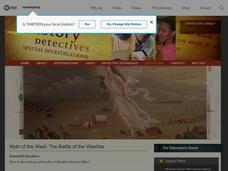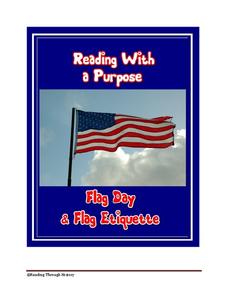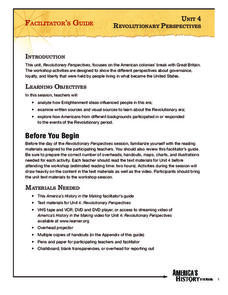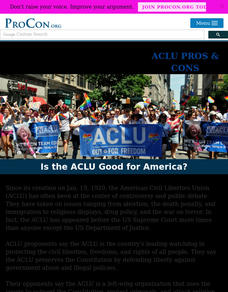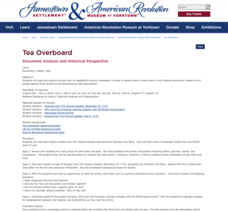Deliberating in a Democracy
Youth Curfews
Don't stay out too late! Scholars analyze the need for youth curfews in a democratic society. They examine primary documents, case studies, and short video clips to form their opinions and take a position on the issue. Holding a class...
US Holocaust Museum
Defying Genocide
Defying death. Defying those who want to do harm. Defying genocide. Pupils research the events in Rwanda to gain an understanding of what it takes to survive a horrific event like a holocaust. They use video, time lines, and Holocaust...
Constitutional Rights Foundation
Women in the Military
Scholars analyze the role of women in the military in United States history. Using group research, debate, and diary entries, they explore various military activity in America. To complete the lesson, young historians write an essay...
Constitutional Rights Foundation
Conservation, Preservation, and the National Parks
Going green? Scholars investigate the creation of the US National Park program. Through diary entries as well as expert testimony, they synthesize information and analyze the need for conservation and preservation. Finally, they display...
Constitutional Rights Foundation
The Cold War: How Did It Start? How Did It End?
What is the difference between a Cold War and a Hot War? Scholars research the beginning of the Cold War. They analyze diary entries as well as excerpts from various events during the 45-year standoff. To finish, they prepare final...
Constitutional Rights Foundation
The Election of 1912
The Election of 1912: an election with four competitive opponents. Pupils get to know the candidates with informative reading passages that provide context to the election. Then, the class engages in a debate and answers questions as one...
PBS
Myth of the West: The Battle of the Washita
Go West, young man! Scholars use PBS video clips, slide shows, and interactive materials to create a picture of Manifest Destiny in the American West. Using a variety of primary and secondary sources, young historians learn about the...
Annenberg Foundation
Egalitarian America
What does a true American represent? Scholars investigate the equal rights era of the 1960s and 1970s in the 20th installment of a 22-part series on American history. Using photographic, magazine, written, and video evidence, groups...
Annenberg Foundation
Global America
It's not really a small world after all! The 21st lesson of a 22-part series on American history researches the impact of globalization on the United States. Using photographic and written references materials, as well as video sources,...
Center for Instruction, Technology, & Innovation
Did African American Lives Improve After Slavery?
The Civil War made slavery illegal, but all ex-slaves were not totally free. Scholars visit eight different classroom stations to uncover life during the Reconstruction Era in America. Groups discover items such as Black Codes, 13th,...
NET Foundation for Television
1850-1874 Railroads and Settlement
Have you ever wondered how your town was placed where it is? Scholars research the impact the advancement of the railroad due to the passage of the Kansas-Nebraska Act had on the formation of civilization in the Great Plains. Map...
US National Archives
Benjamin Franklin: Politician and Diplomat
A scientist, inventor, entrepreneur, politician, and the founder of a nation—and that's just one person! Learners investigate the many lives of Benjamin Franklin. Using a hands-on interactive online resource, they analyze primary...
State Bar of Texas
Marbury v. Madison
Who has the final say in matters dealing with the rules under the United States Constitution? The case Marbury v. Madison brings to light the issue of judicial review. Learners investigate the Supreme Court's opinion in the case with a...
Reading Through History
Flag Day
Why is the United States flag such an important symbol to America that it gets its own day to celebrate it? Pupils read a passage that discusses the symbolism and significance of the American flag. Following the reading, they answer quiz...
Reading Through History
The Emancipation Proclamation
The Emancipation Proclamation: one of the most important primary sources for studying American history! An interdisciplinary resource includes a reading of Abraham Lincoln's seminal speech quoted directly. Following the reading, pupils...
Equality and Human Rights Commission
Discrimination
Discrimination takes many forms, and lesson eight in the 12-part series addresses many types and their greater impact on society. The lesson uses a presentation, videos, news stories, and discussions to synthesize many different viewpoints.
Council for Economic Education
FRED and the Federal Budget Interactive Lesson
How can a federal debt accumulate over time? The Federal Reserve Economic Data (FRED) dashboard allows scholars to actively research each aspect of the federal budget. In pairs, they analyze economic data to determine the best way to...
Annenberg Foundation
Revolutionary Perspectives
Life, liberty, and the pursuit of happiness. Learners go to the heart of the causes of the American Revolution. Examining political cartoons, Enlightenment documents, and firsthand accounts, they present their ideas and reflective...
USA.gov
How The Supreme Court Works
Just how does a case come before the highest court in the land? A graphic flow chart unpacks how plaintiffs come before the Supreme Court. Graphics include background on the nine justices and just how many cases they actually hear each...
Carolina K-12
African Americans in the United States Congress During Reconstruction
The Civil Rights Act of 1866, which granted citizenship to all males in the U.S., resulted in the first African Americans to be elected to Congress. Class members research 11 of these men, the challenges they faced, and craft...
Curated OER
ACLU
Is the American Civil Liberties Union (ACLU) good for America? The informative website is a one-stop shop for ACLU debate resources. Scholars read about the topics surrounding the issue, including free speech, national security, and...
Judicial Learning Center
Law and the Rule of Law
We hear a lot about the importance of the rule of law, but most people do not really know what those words mean. The lesson is a webpage that defines the rule of law, explains why it is important in a democratic society and provides...
Jamestown-Yorktown Foundation
Tea Overboard
While less well known than the event in Boston, the Yorktown Tea Party was equally decisive in turning community sentiment against Great Britain. To gain an understanding of why the colonists objected to the Tea Act, young historians...
ProCon
Drone Strikes Overseas
Should the United States continue the practice of using drone strikes abroad? Readers explore the top pro and con arguments in preparation for a debate or discussion about the topic. They read about the history of drone strikes, view a...
Other popular searches
- U.s. Government
- Branches of Government
- Three Branches of Government
- 3 Branches of Government
- Types of Government
- State Government
- Forms of Government
- Local Government
- Canadian Government
- Us Government
- Government Agencies
- American Government


